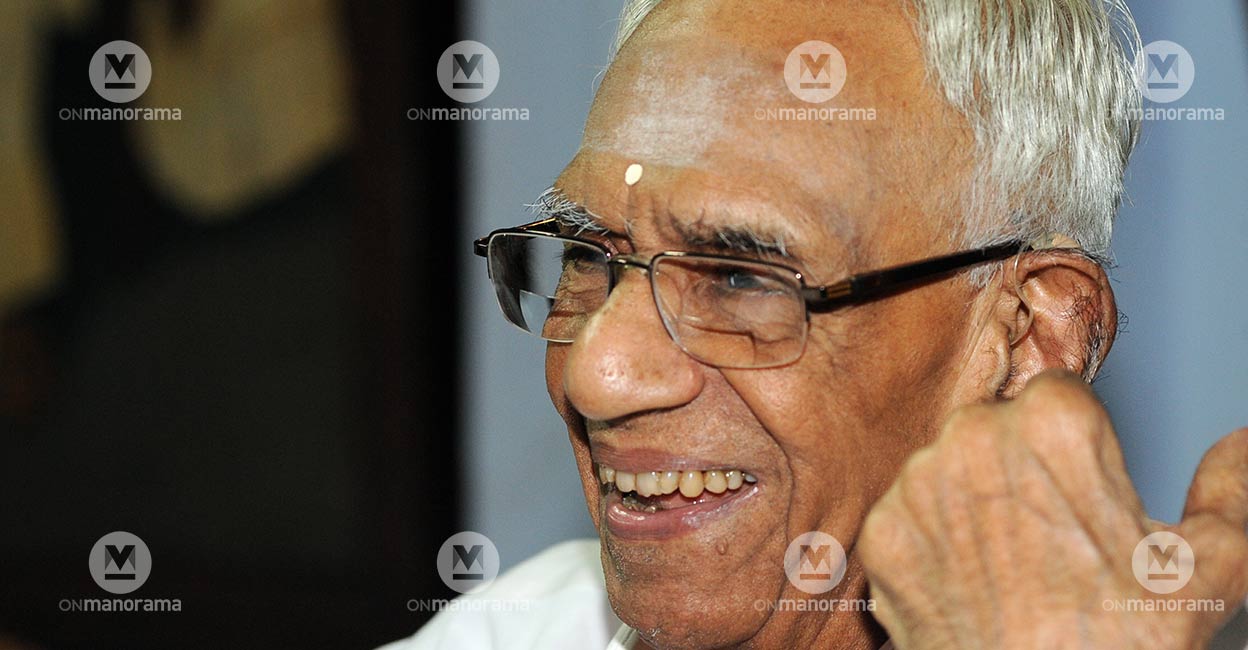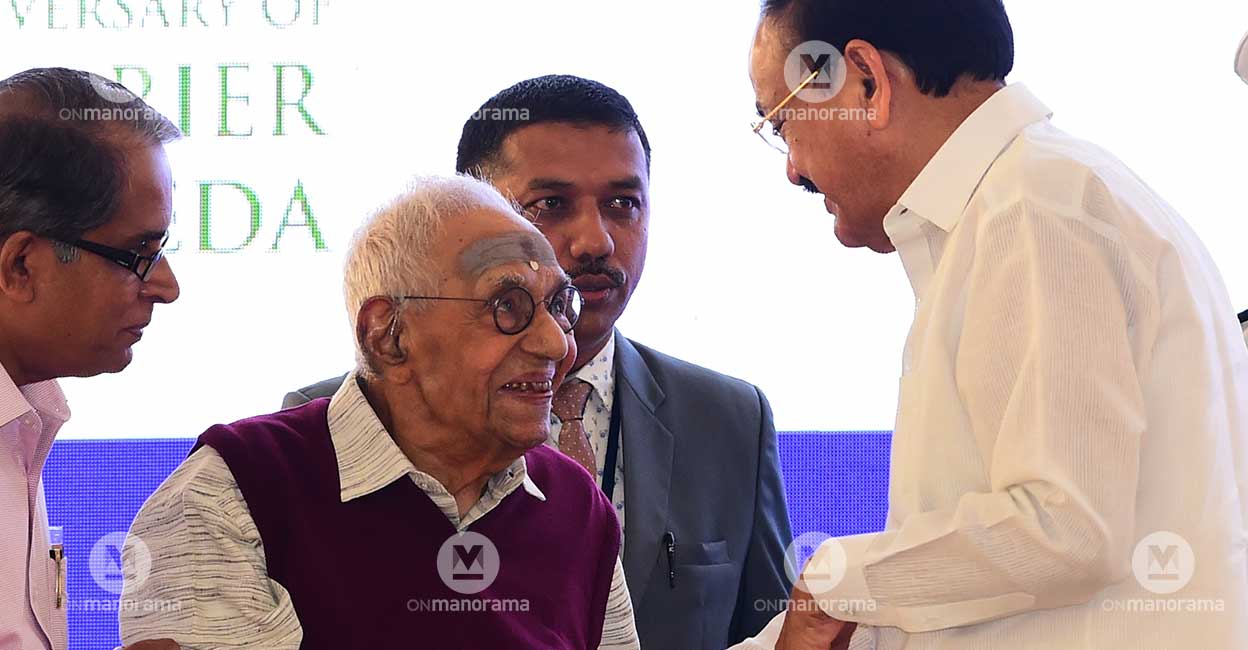From revolutionary to Ayurveda proponent: Life story of Dr P K Warrier, who lived a 100 years

Mail This Article
Thousands of people whose lives were touched by Ayurveda Acharya Dr P K Warrier had offered him greetings and prayers when he turned 100 on June 8.
Dr Warrier had approached life with a revolutionary zest, aiming to alleviate pain and to provide a healthy and happy life to those who had pinned their hopes on him.
People on the life’s fast lane have often been apprehensive over the prolonged treatment that Ayurveda warrants. For them, Dr Warrier had an assuring response — simple, powerful and effective as the many formulations he prescribed at the Kottakkal Arya Vaidya Sala.
“The path that Ayurveda takes, and its pace, may vary. But it’s effective,” he used to tell them.
The Arya Vaidya Sala, which flourished under him, stands testimony to his philosophy on Ayurveda.
Dr Warrier’s life, too, had been like Ayurveda, moving at a steady pace of its own, impacting several lives. The trail, the man who lived a 100 years, has left is one of cure and rejuvenation. Thousands, who have had a fresh start after various diseases, will vouch for his brilliance.
Dr Warrier had been avoiding in-person medical consultations because of the Covid-19 situation. Yet, he had been active as ever, and he was fully immersed in finding new solutions to various diseases, and passing on treatment regimens to his colleagues. He had remained active in the administrative affairs of the Arya Vaidya Sala until recently.
Into Communist camp
The life of Dr Warrier cannot be described in brief. The paths he had trodden may come as a surprise to many.
Attracted by the Indian freedom struggle, a young Panniyampilly Krishnankutty Warrier became a revolutionary, leaving his studies behind. He later became an ordinary factory manager at Arya Vaidya Sala, before taking over its reins and developing the institution as a renowned centre of Ayurveda and carving a niche for himself as a globally renowned Ayurveda physician.

Dr Warrier was the youngest of the six children of Thalappanathu Sreedharan Namboothiri and Kunji Varasyar. He was born on the day of Karthika star in the Malayalam month of Edavam (it was on June 8 this year) in 1921 (year according to the Gregorian calendar).
Despite aspiring to become an engineer, he followed his family tradition and started learning Ayurveda under the tutelage of his uncle, Vaidyarathnam Dr P S Varier. The student, however, did not continue the studies for long.
It was the time when Mahatma Gandhi had launched the Quit India Movement. The movement sparked the revolutionary spirit in the young man, and he left home and joined the Communist camp at Manjeri.

The young revolutionary’s major tasks then were to deliver party messages to leaders in hiding and to engage in anti-fascist campaigns. During this period he established friendship with prominent political leaders at the national and state levels.
Meanwhile, Dr P S Varier was not impressed with his nephew’s political foray, that too after quitting studies midway. Still, the older man did not show his disappointment. His refrain was simple:
“It will be difficult for both of us if he says no to me asking him to return. Let him return on his own,” Dr Varier reportedly said.
.jpg)
The young Warrier returned, after realizing that active politics was not his cup of tea, and re-commenced his pursuit of Ayurveda. Before completing his studies, he became a trustee member of the Kottakkal Arya Vaidya Sala at the age of 24. His uncle had founded the institute in 1902.
Humble beginning at ‘Adukkala’
The Arya Vaidya Sala has its footprint across the country today, but it has been flourishing on the credibility that Dr P K Warrier established and consolidated over the years.
His autobiography, ‘Smrithiparvam’, thus puts his philosophy behind the growth of the institute: “We should begin small and then flourish. We should not start big and shrink.”
Dr Warrier had started his career as the Manager of ‘Adukkala’, or kitchen, at Arya Vaidya Sala, for a monthly salary of Rs 112.50, which also included a dearness allowance.
He took over the reins of the establishment after the death of the Managing Trustee and his elder brother PM Warrier in an air crash in 1953.
His later life was also the history of the Ayurveda institute, and the development of a Malappuram municipal township, Kottakkal, now synonymous with Arya Vaidya Sala.
.jpg)
Today, Kottakkal and Arya Vaidya Sala have become the most searched names in the global health map.
The institute’s annual revenue was Rs 9 lakh when Dr Warrier took over as the Managing Trustee. Today, it stands at over Rs 400 crore. The Arya Vaidya Sala now provides direct employment to more than 2,000 people, and has branches in all major Indian cities. It uses more than two kilograms of gold every month to manufacture medicines.
The institute, along with its branches, treats more than five lakh patients on an average annually.
Until he departed, Dr Warrier had been the Managing Trustee of the institution. Perhaps, he was one of the rare long-serving top executives of any Indian organization.
.jpg)
The Allopathy branch at Kottakkal, research ward, medicinal plants’ garden, Ayurveda research centre, publication division, all stand testimony to Dr Warrier’s visionary streak.
Clockwork routine
Punctuality in professional as well as personal life was of utmost importance to Dr Warrier. He used to get up at 4 am, and spent about 30 minutes for physical exercise. He used to take a shower at 5:55am before offering prayers at the memorial of his uncle P S Varier and ‘Vishwambara Temple’, his family’s shrine.
After returning from the temple, he read ‘Ashtanga Hridayam’, one of the three major literary works of Ayurveda. Tender coconut water was his breakfast. After that, he reached the consultation room at 8am.

Lunch was at 1pm, and an hour later, he was in the office of the Managing Trustee. He used to return home by 6pm and that had been his routine till the outbreak of the pandemic.
On the subject of punctuality, Dr Warrier had written in his autobiography about an incident involving Kesava Menon for the inauguration of a seminar at Arya Vaidya Sala in 1964. “While inviting him, he asked about the exact time—when you say 4, when will it actually begin? I replied: Since it’s fixed for 4pm, it will begin at 4pm.”
The healing touch
Dr P K Warrier was a hospital without a cash counter. He had not received even a penny as consultation fee during his practice that had spanned more than seven decades.
For him, ‘vaidyam’—or healing—was not a way of livelihood, but was destiny. Though a stickler for punctuality, he made some compromise while treating patients.
A session with Dr Warrier used to begin with a friendly, courteous conversation. Once the patient was made at ease, the physician enquired about the health condition. He listened to the patients—without checking the time—before prescribing the treatment. He was in no hurry with his patients.
The courteous behaviour and the effectiveness of his treatment had made patients willing to wait long for an appointment with him. They had a reason too: Dr Warrier has cured several diseases, which other doctors had written-off as “incurable.”
.jpg)
There were also several instances in which patients, confined to wheelchairs for long, returned on foot after the treatment at the Vaidya Sala. His patients came from all walks of life; heads of states, intellectuals, senior bureaucrats, artists and ordinary people.
Nation’s pride
Though Arya Vaidya Sala had flourished under Dr Warrier, he had felt that it was a continuation of what his uncle had begun.
Though Dr Warrier never made any claims, the country did notice his contribution to Ayurveda and healthcare. India honoured him with Padma Shri in 1999, and followed it up with Padma Bhushan in 2010.
The All India Ayurvedic Conference conferred him with the title, ‘Ayurveda Maharshi’ in 1997, for his saint-like pursuit of Ayurveda.
Dhanwanthari Award, Ashtangarathnam constituted by the State government, Dr Paulose Mar Gregorios Award, Pathanjali Award, C Achutha Menon Award, honorary D Litt from MG and Calicut universities, are a few of the honours he had received.

Dr Warrier was married to the late poet Madhavikutty Varasyar. Dr K Balachandran Warrier, the late K Vijayan Warrier, and Subhadra Ramachandran are his children. Rajalakshmi, Rathi Vijayan and K V Ramachandran Warrier are his children-in-law.
Doctor compassionate
Dr Warrier could recall the names of thousands of medicines, but the medicine he valued the most was compassion. He had mentioned about an acute diabetic woman in his autobiography.
The woman was leaving after treatment. With tears welling up, she said in a breaking voice: “You gave me my life back… You gave me my life back…”
“She kept on repeating even as she left the hospital. Her expression left me speechless. Give life back! This is why people place healthcare on a high pedestal. Compassion is the basis of Ayurveda. A physician’s life is fulfilled when a patient says ‘you gave me life back’ with gratitude.”

The book of life that Dr Warrier had penned over a 100 years was on compassion. Each leaf in the book still deals with and teaches the same quality—compassion.
Medicinal plant named after Dr Warrier
A medicinal plant discovered in Kannur’s Aralam Forest in Kannur district is named after Dr P K Warrier. The plant, with the scientific name, Gymnostachyum warrieranum, was being nurtured in the Vaidya Sala’s medicinal plant section.
A team of researchers under Dr Prabhu Kumar and Dr Indira Balachandran of the institute’s medical plant research centre had found the plant.
The following are Dr Warrier’s responses to a few quick questions.

It is said that mother is the first physician. What was the major quality and medicine you have received from your mother?
My mother had a special affection towards me since I was the youngest child. Other than breast milk, which other medicine could a mother give? Is there a bigger medicine for a child than breast milk?
I realized the importance of breast milk only after I started studying Ayurveda. My mother was a stickler for punctuality, a quality that was passed on to me.
We had spent our childhood at Thazhevariyathu in Kottakkal. Earlier there were employees taking care of the daily affairs. Later, my mother took over the responsibility, and she executed her duties in a way amicable to all. That’s how I learned to love and be compassionate to others.
Towards her end, she suffered from cancer. In a way, her memories have prompted me to start a cancer wing attached to the charitable hospital.
What is your experience about the simple way of living?
I don’t have excess interest in anything. I live with a sense of reality, and won’t do anything deliberately that might cause harm to others. I prefer to live with nature, following the Ayurveda way of life. I follow Vagbhadan’s advice of eating in moderation. That’s my path as a physician. My grand uncle was also a role model when it comes to food.
Can you tell us the happiest moment in your life as a physician?
I feel happy when I see patients, who had lost hope in treatment elsewhere, getting cured here. I cannot cite a single instance, but there is a case worth mentioning.
There was a retired IAS officer, an excellent administrator. I am not revealing his identity. He had been unconscious after suffering a cerebral stroke. I had to treat him at an allopathy hospital, where he had been admitted. I prescribed him a concoction made of the flowers of Ceylon slitwort (Leaucas zeylanica) and cumin seeds, breastmilk, and a ‘kizhi’ (a linen pouch filled with medicinal grains or herbs) head massage.
For two days, his condition remained unchanged. On the third day, he regained consciousness. He completed the treatment at the nursing home at Kottakkal, where he regained his health. He was with us for a long time after the treatment.
What makes you sad?

My aide Murali has asked the same question earlier. I have the same answer for you too. Time is testing Ayurveda hard. When we say yesterday, it now refers to bygone olden days. I feel Ayurveda is struggling to stay ahead of the changing times. Another aspect that makes me very sad is when medical science has nothing to offer to some who seek its help.
What is your biggest luck?
Arya Vaidya Sala is an institution that provides health and happiness. I feel it’s a big achievement to be able to take the institution forward as envisaged by its founder, my grand uncle.
What is your dream?
I believe more in reality than in dreams. I share my uncle’s aim to take Ayurveda to greater heights. I dream of a world where Ayurveda is internationally accepted, and expanding the Vaidya Sala further. It’s said that intense dreams often become reality.
(This article, written last month after the Ayurveda Acharya turned 100, is being republished with a few changes)

